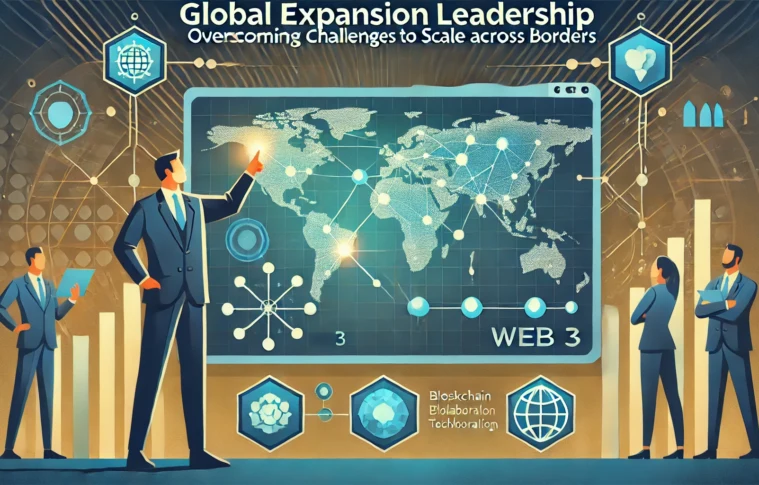Web3 startups are inherently global, leveraging blockchain technology to transcend geographical boundaries. From creating decentralized applications (dApps) to building blockchain infrastructure, these startups operate in diverse markets, serving users worldwide. However, with global reach comes a unique set of challenges.
This article explores how Web3 leaders navigate cultural, regulatory, and operational complexities to expand their ventures across borders, with actionable insights and inspiring examples.
Why Global Expansion is Essential in Web3
Web3 projects are designed for a borderless digital world. Expanding globally enables startups to:
- Reach Diverse Markets: Access users from varying demographics and regions.
- Leverage Global Talent: Tap into skilled professionals across the world.
- Drive Decentralization: Strengthen the project’s core principles by distributing operations and governance.
However, scaling globally requires more than just a great product—it demands visionary leadership and strategic planning.
Challenges of Global Expansion in Web3
1. Navigating Diverse Regulatory Environments
Regulations around blockchain, crypto, and NFTs vary widely across countries, requiring Web3 startups to adapt their operations.
Example: Binance had to restructure its global operations, exiting certain markets while securing licenses in others, such as Dubai and France.
2. Bridging Cultural Differences
Cultural nuances impact communication, marketing strategies, and user engagement. Web3 leaders must ensure their products resonate across diverse markets.
3. Managing Distributed Teams
Operating across multiple time zones and regions can create communication barriers and workflow inefficiencies.
Example: DAOs often face challenges coordinating globally distributed contributors, highlighting the need for robust collaboration tools.
4. Building Localized Communities
Engaging local users while maintaining a unified global vision can be tricky. Tailoring marketing efforts without losing the project’s core identity is crucial.
Strategies for Successful Global Expansion
1. Regulatory Readiness
Work with legal experts to understand and comply with local regulations. Maintain flexibility in your operational models to adapt to changing laws.
2. Localized Marketing
Tailor campaigns to resonate with regional audiences. Collaborate with local influencers and communities to build trust and familiarity.
Example: Polygon’s expansion into Southeast Asia involved partnerships with local blockchain associations to educate and onboard users.
3. Strong Communication Infrastructure
Leverage tools like Slack, Discord, and project management platforms to keep distributed teams aligned. Decentralized collaboration tools can help manage DAOs effectively.
4. Establish Regional Hubs
Setting up local offices or hubs in key markets helps streamline operations and foster closer connections with local communities.
5. Focus on Cross-Cultural Leadership
Train leaders to manage diverse teams, emphasizing cultural sensitivity and inclusion. Leaders must adapt their management styles to fit different regional work ethics and expectations.
Case Studies in Global Expansion
1. Uniswap’s Global Community Engagement
Uniswap’s governance model allows token holders worldwide to vote on platform changes. By fostering a global community, Uniswap ensures its decisions reflect diverse user needs.
2. Chainalysis: Regulatory Compliance at Scale
Chainalysis, a blockchain analytics company, expanded globally by focusing on regulatory compliance. Their localized approach helped them establish strong relationships with governments and enterprises.
3. Solana’s Developer Outreach
Solana’s expansion strategy included hosting hackathons worldwide to attract developers and build a robust global ecosystem. This grassroots approach strengthened its community while driving adoption.
FAQs on Global Expansion in Web3
How do Web3 startups navigate international regulations?
By collaborating with legal experts, maintaining compliance, and adjusting operations to meet local requirements.
Why is cultural sensitivity important for global Web3 leaders?
Understanding cultural differences improves communication, marketing effectiveness, and team cohesion.
What tools help manage globally distributed teams?
Slack, Discord, Zoom, and decentralized project management tools like Colony or Aragon can streamline collaboration.
How can Web3 startups build local communities?
Engage local influencers, translate content into regional languages, and host events or meetups to foster connection.
Conclusion: The Future of Global Leadership in Web3
Global expansion is both a challenge and an opportunity for Web3 startups. Leaders who embrace regulatory adaptability, cultural sensitivity, and innovative strategies can unlock immense growth potential. By fostering localized communities and leveraging global talent, Web3 startups can strengthen their decentralized ethos while scaling across borders.
Ready to take your Web3 project global? The future is waiting for bold leaders to seize the opportunity.



